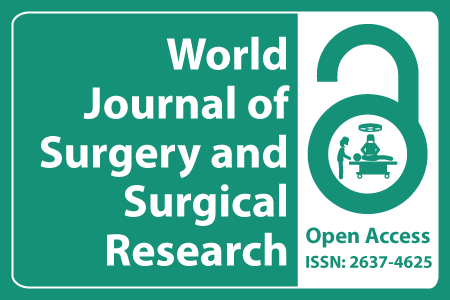
Journal Basic Info
- Impact Factor: 1.989**
- H-Index: 6
- ISSN: 2637-4625
- DOI: 10.25107/2637-4625
Major Scope
- Aesthetic & Cosmetic Surgery
- Emergency Surgery
- Oral & Maxillofacial Surgery
- Ophthalmology
- Minimal Invasive Surgery
- Cancer Surgery
- Otolaryngology & ENT Surgery
- Cardiovascular Surgery
Abstract
Citation: World J Surg Surg Res. 2020;3(1):1259.DOI: 10.25107/2637-4625.1259
A Multidisciplinary Algorithm in the Non-Operative Management of Upper GI Complications – A Retrospective Cohort Study
Koshy RM
Department of General Surgery, University Hospitals of Coventry and Warwickshire NHS Trust, UK
PDF Full Text Research Article | Open Access
Abstract:
Introduction: The non-operative management of UGI complications lacks consensus, despite being
the subset that requires a concerted multidisciplinary approach. The aim of this study is to propose
an algorithm of management, with early endoscopy and interventional radiology as adjuncts to
surgical interventions.
Methods: This retrospective cohort describes the management of 37 patients over a 5 year period
with the evolution of a multidisciplinary team and an algorithm of management in a tertiary UGI
centre. The cohort included 15 bariatric, 12 Cancer and 10 Oesophageal perforation patients. The
primary outcome was the morbidity profile and mortality the secondary outcome.
Results: The median number of stents used per patient across the groups was two. The leak resolution
time was 34, 52.5 and 60.5 days among the cancer, bariatric and perforation groups, respectively.
Radiological drains were required in about 36% of patients across the groups. Nutritional access was
established with Naso-Jejunal tubes with overlapping TPN in the bariatric and perforation groups,
while the cancer group had Feeding Jejunostomy tubes inserted during their resections. The mean
duration of hospital stay was 29.5, 41.5 and 63 days respectively. Three (8%) patients developed
major stent-related complications (Clavien-Dindo Grade 3b) requiring reoperation. There were no
mortalities in the cohort.
Conclusion: Though heterogeneous, UGI complications have common management principles.
The non-operative management algorithm with endoscopy and adjuncts is still an aggressive,
yet conservative approach with prompt control of sepsis and establishment of early nutrition.
This multidisciplinary approach is an effective means of resolution with minimal morbidity and
mortality.
Keywords:
Upper GI complications; Non-operative management; Endoscopic algorithm; Multidisciplinary approach
Cite the Article:
Koshy RM. A Multidisciplinary Algorithm in the Non-Operative Management of Upper GI Complications – A Retrospective Cohort Study. World J Surg Surgical Res. 2020; 3: 1259..













